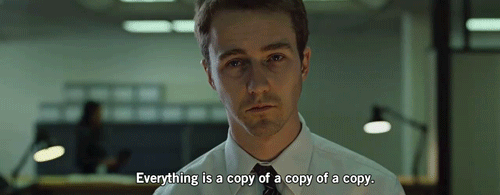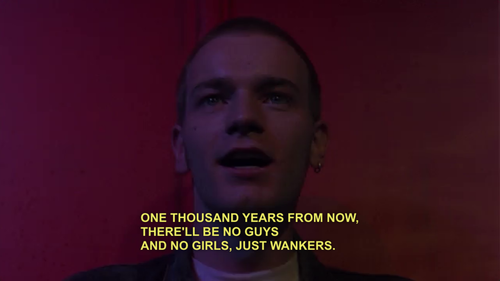Many films deal with the idea of 'materialism' and how we tend to define ourselves with the objects which we own. The two films which I am going to be discussing are Fight Club (mainly) and Trainspotting.
As we know, Fight Club satirises society's (and our own) attitudes towards the world and the narrator, Edward Norton, almost mocks us in our ways. Initially, he too lives in a materialistic reality... until he blows up his own apartment.
Here are some of my favourite quotes from Fight Club which encapsulate the ideology of the film:
"Man, I see in Fight Club the strongest and smartest men who’ve ever lived. I see all this potential, and I see it squandered. God damn it, an entire generation pumping gas, waiting tables – slaves with white collars. Advertising has us chasing cars and clothes, working jobs we hate so we can buy shit we don’t need. We’re the middle children of history, man. No purpose or place. We have no Great War. No Great Depression. Our great war is a spiritual war. Our great depression is our lives. We’ve all been raised on television to believe that one day we’d all be millionaires, and movie gods, and rock stars, but we won’t. We’re slowly learning that fact. And we’re very, very pissed off."
"You are not your job. You’re not how much money you have in the bank. You’re not the car you drive. You’re not the contents of your wallet. You’re not your fucking khakis. You’re the all-singing, all-dancing crap of the world."
The main character later adds: "I am Jack's wasted life".
I feel strongly that the way our world functions is severely fucked up. Edward Norton is correct in the sense that the large majority of us work endless, monotonous 9-5 jobs...for what? So we can receive a pay check? So we can buy things? So we can 'make a living'? So we can try to feel 'normal'? Whilst Fight Club may be a slight generalisation of all members of society (as some of us may actually enjoy our jobs, maintain happiness and not depend upon material things to fuel our egos), it still holds a valid point and reveals our sheer hypocrisy. Whether the route which Jack takes in an attempt to reject convention is sustainable or not, is a different matter.

Similarly to Fight Club, the 1996 film Trainspotting also sets out to undermine society's values:
Choose Life. Choose a job. Choose a career. Choose a family. Choose a fucking big television, choose washing machines, cars, compact disc players and electrical tin openers. Choose good health, low cholesterol, and dental insurance. Choose fixed interest mortage repayments. Choose a starter home. Choose your friends. Choose leisurewear and matching luggage. Choose a three-piece suite on hire purchase in a range of fucking fabrics. Choose DIY and wondering who the fuck you are on a Sunday morning. Choose sitting on that couch watching mind-numbing, spirit-crushing game shows, stuffing fucking junk food into your mouth. Choose rotting away at the end of it all, pishing your last in a miserable home, nothing more than an embarrassment to the selfish, fucked up brats you spawned to replace yourself. I chose not to choose life. And the reasons?
The irony in the narrative stems from the the word ‘choose’; as mere products of society, can we ever truly choose? Must we face that our entire lives remain governed by social, financial and political structures?
If you have ever watched Trainspotting, you will be aware that (in the end), the main character Renton eventually buys into society after he has stolen a large sum of heroin profits from his 'friends'. However, it can be sensed that he is not entirely comfortable with his new stance: causing us to doubt its authenticity and predicting that his attempt to be 'normal' could backfire.
The freeze frame which we see of Renton echoes the opening sequence of the film, yet is entirely ambiguous. It may now seem that he is lonely in existence, which is perhaps a necessity of the first steps towards buying into conventional society.
For practical reasons, it seems that we MUST buy into our materialistic world...to some extent.
